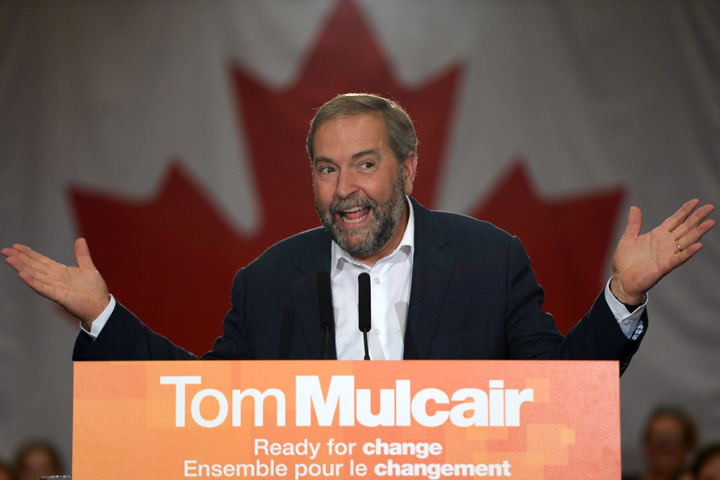The NDP is still projected to form government on Oct. 19 but the latest seat projections from the Laurier Institute for the Study of Public Opinion and Policy (LISPOP) show the overall numbers mask fluctuating regional support and the probable demise of the Bloc Quebecois.

Overall, the NDP is projected to pick up 132 seats, two less than on Aug. 25. The Conservatives have added three more seats since last week and are projected to pick up 119 seats. The Liberals are stagnant at 86 and the Green party is still holding onto its one seat in British Columbia.
But the Bloc Quebecois, which at its height of popularity formed the Official Opposition, is projected to pick up zero seats according the latest LISPOP projection.
And that’s mostly a symptom of the NDP’s strength in the province.
“I think the notion of the fact that the Bloc was the best way to represent Québec interests, which sort of lasted for a couple decades, I think that’s pretty much dissipated,” Barry Kay, a politics professor at Wilfrid Laurier University said during an interview Tuesday. “This is the first time I’ve had the Bloc with no seats at all.”
In-Depth: Federal Election 2015
- Alberta to overhaul municipal rules to include sweeping new powers, municipal political parties
- Canada, U.S., U.K. lay additional sanctions on Iran over attack on Israel
- No more ‘bonjour-hi’? Montreal mayor calls for French only greetings
- Trudeau says ‘good luck’ to Saskatchewan premier in carbon price spat
Quebec is without question the base of the NDP’s power. Kay’s projections see it picking up 63 of the 78 seats. The Liberals are projected to win 10 while the Conservatives could pick up five.
“Certainly Québec is something that has been moving in a very much NDP direction. Without Québec, the NDP would not be in the number one position in either popular votes or in seats,” Kay said.
Election Primer: Canada could be moving to proportional representation – so what is it and how does it work?
Though the projections may not hold over the historic length of the 2015 election campaign, the NDP has never been so popular in Quebec. The NDP only picked up 59 seats during the 2011 election when then-leader Jack Layton led the party to the Official Opposition status. When the Bloc Quebecois formed official opposition status in 1993, it only had 54 seats (though there were only 295 seats in the House of Commons at the time).
LISPOP based the seat projections from an aggregate of over 13,000 interviews from Angus Reid, Ipsos, Abacus, Ekos, Forum and Innovative Research conducted in late August.
British Columbia
While Tuesday’s LISPOP projections show the NDP solidifying its grasp on Quebec, the frontrunner did lose seats in British Columbia, making Canada’s western-most province a little more competitive.
Since last week’s projections, the NDP is projected to win six fewer seats, while the Conservatives are expected to win seven more.
“You can say there is recent momentum in B.C. towards the Conservatives. But that’s recent momentum,” Kay said.
READ MORE: Harper tries to put a positive spin on negative growth
The NDP still leads in B.C., but only by two seats. It’s projected to win 18 of the province’s 42 seats, while the Conservatives and Liberals are expected to pick up 16, and 7, respectively. The Green Party is expected to hold on to leader Elizabeth May’s Saanich-Gulf riding – the party’s only seat in Canada.
Regionally, the Liberals still lead in the Atlantic provinces with 21 of the 32 seats up for grabs, and are competitive in Ontario, projected to win 40 of the province’s 121 seats. The Conservatives are projected to win Ontario with 50 seats despite the province’s popular vote being evenly distributed among the Liberals, NDP, and Conservatives.
Canadians go to the polls on Oct. 19.





Comments